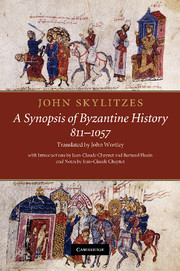Book contents
- Frontmatter
- Contents
- The English translator’s Preface
- Introduction
- Re-writing history: John Skylitzes’ Synopsis historion
- Foreword
- Chapter 1 Michael I Rangabe, the Kouropalates [811–813]
- Chapter 2 Leo V the Armenian [813–820]
- Chapter 3 Michael II the Stammerer [820–829]
- Chapter 4 Theophilos [829–842]
- Chapter 5 Michael III, the son of Theophilos [842–867], and his mother Theodora [842–862]
- Chapter 6 Basil I Kephalas, the Macedonian [867–886]
- Chapter 7 Leo VI the Philosopher (the Wise) [886–912]
- Chapter 8 Alexander [912–913]
- Chapter 9 Constantine VII, Porphyrogennetos [913–959]
- Chapter 10 Romanos I Lekapenos [919–944]
- Chapter 11 Constantine VII [944–959]
- Chapter 12 Romanos II the Younger [959–963]
- Chapter 13 Basil II Bulgaroktonos and Constantine VIII [976–1025]
- Chapter 14 Nikephoros II Phokas [963–969]
- Chapter 15 John I Tzimiskes [969–976]
- Chapter 16 Basil II and Constantine VIII bis [976–1025]
- Chapter 17 Constantine VIII [1025–1028]
- Chapter 18 Romanos III Argyros [1028–1034]
- Chapter 19 Michael IV the Paphlagonian [1034–1041]
- Chapter 20 Michael V Kalaphates [1041–1042]
- Chapter 21 Constantine IX Monomachos [1042–1055]
- Chapter 22 Theodora [1055–1056]
- Chapter 23 Michael VI the Elder/Stratiotikos [1056–1057]
- Glossary
- Bibliography
- Index
- References
Chapter 12 - Romanos II the Younger [959–963]
Published online by Cambridge University Press: 05 July 2014
- Frontmatter
- Contents
- The English translator’s Preface
- Introduction
- Re-writing history: John Skylitzes’ Synopsis historion
- Foreword
- Chapter 1 Michael I Rangabe, the Kouropalates [811–813]
- Chapter 2 Leo V the Armenian [813–820]
- Chapter 3 Michael II the Stammerer [820–829]
- Chapter 4 Theophilos [829–842]
- Chapter 5 Michael III, the son of Theophilos [842–867], and his mother Theodora [842–862]
- Chapter 6 Basil I Kephalas, the Macedonian [867–886]
- Chapter 7 Leo VI the Philosopher (the Wise) [886–912]
- Chapter 8 Alexander [912–913]
- Chapter 9 Constantine VII, Porphyrogennetos [913–959]
- Chapter 10 Romanos I Lekapenos [919–944]
- Chapter 11 Constantine VII [944–959]
- Chapter 12 Romanos II the Younger [959–963]
- Chapter 13 Basil II Bulgaroktonos and Constantine VIII [976–1025]
- Chapter 14 Nikephoros II Phokas [963–969]
- Chapter 15 John I Tzimiskes [969–976]
- Chapter 16 Basil II and Constantine VIII bis [976–1025]
- Chapter 17 Constantine VIII [1025–1028]
- Chapter 18 Romanos III Argyros [1028–1034]
- Chapter 19 Michael IV the Paphlagonian [1034–1041]
- Chapter 20 Michael V Kalaphates [1041–1042]
- Chapter 21 Constantine IX Monomachos [1042–1055]
- Chapter 22 Theodora [1055–1056]
- Chapter 23 Michael VI the Elder/Stratiotikos [1056–1057]
- Glossary
- Bibliography
- Index
- References
Summary
After Constantine [VII] had departed this life and passed on to the hereafter, Romanos his son came to power. He appointed officials who were fervently loyal to him and, once he had assured his hold on the empire as securely as possible, he crowned his son Basil at the feast of Easter, still in the third year of the indiction, by the hands of the patriarch Polyeuktos, at the Great Church.
The following year another son was born [to Romanos], this one in the palace at Pege, whom he called Constantine after his father.
[Romanos] was young and devoted to pleasure; he abandoned the supervision of every matter to Joseph Bringas, the praepositos and parakoimomenos, for he himself would have nothing to do with anything but the pursuit of ribald behaviour in the company of silly young men who frequented prostitutes, wantons, actors and comedians. There was a cleric, a eunuch who, warned by the emperor Constantine about his disorderly behaviour, had adopted the monastic habit and kept himself out of sight until the emperor's death. But as soon as Romanos came to power, he made him throw off the monastic habit and put on the garb of a secular cleric, associating himself with the attendants of the imperial bedchamber. Now Polyeuktos, full of zeal, importuned and besought the emperor at great length to discharge this man [249] from his service for having renounced the monastic profession. The emperor refused, claiming that [John] had never really taken the monastic habit or had the office [of clothing] said over him by any one of the priests; he had feigned the monastic way of life for fear of the emperor and, taken in by this, Polyeuktos let the matter drop - Joseph also having worked hard to attain that result. [As for John], he lived a secular, disorderly life until the death of Romanos, after which he again assumed the monastic habit. But he did not change his state of mind.
- Type
- Chapter
- Information
- John Skylitzes: A Synopsis of Byzantine History, 811–1057Translation and Notes, pp. 239 - 244Publisher: Cambridge University PressPrint publication year: 2010

